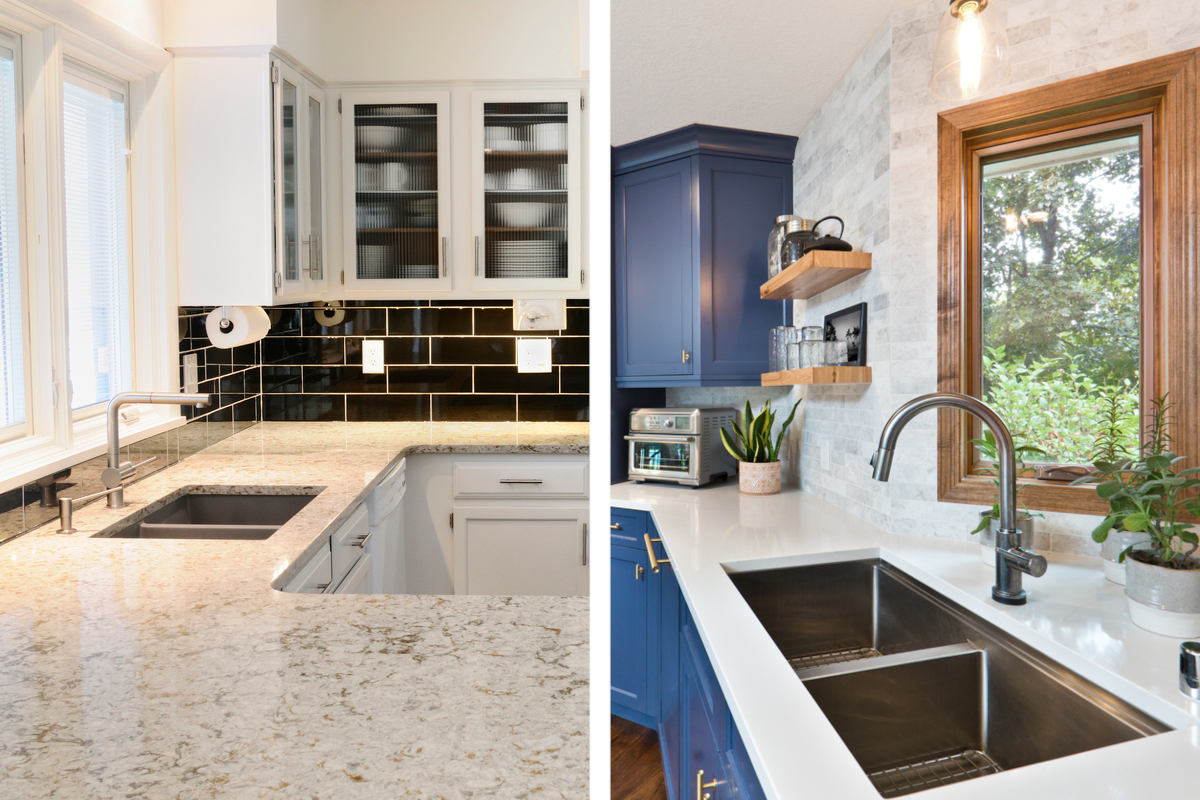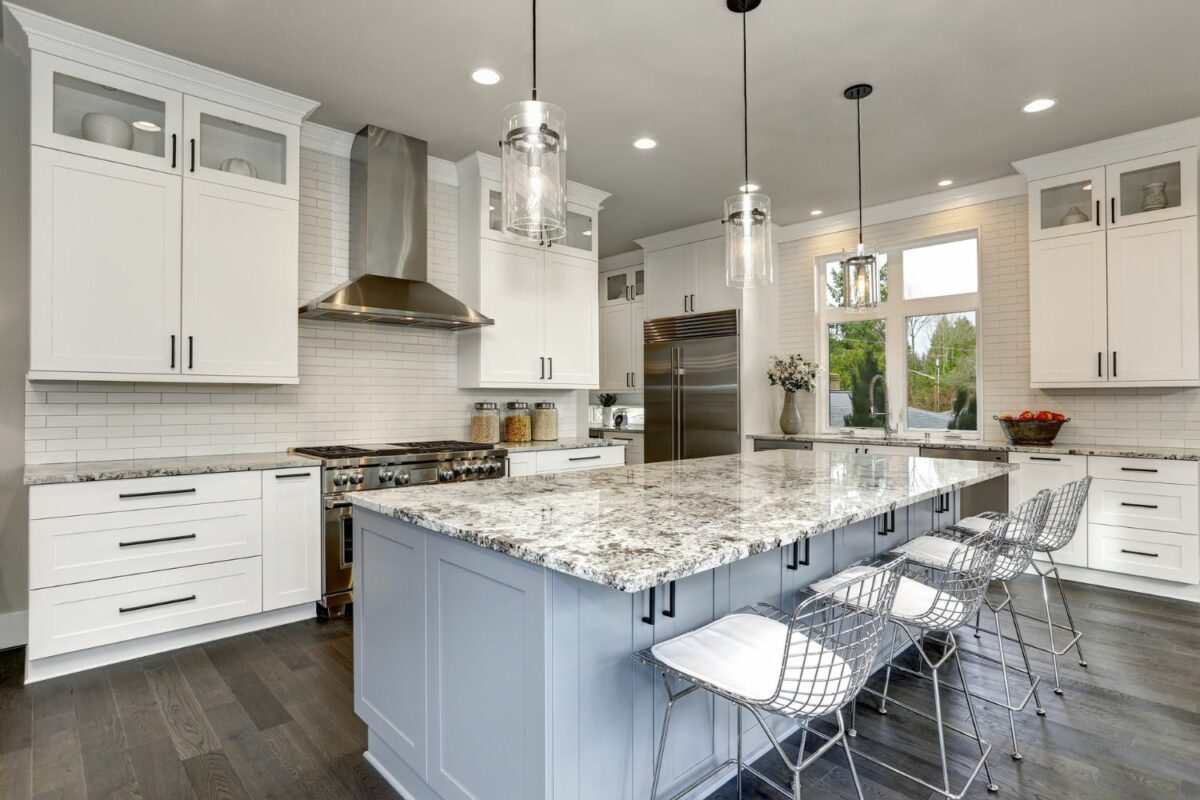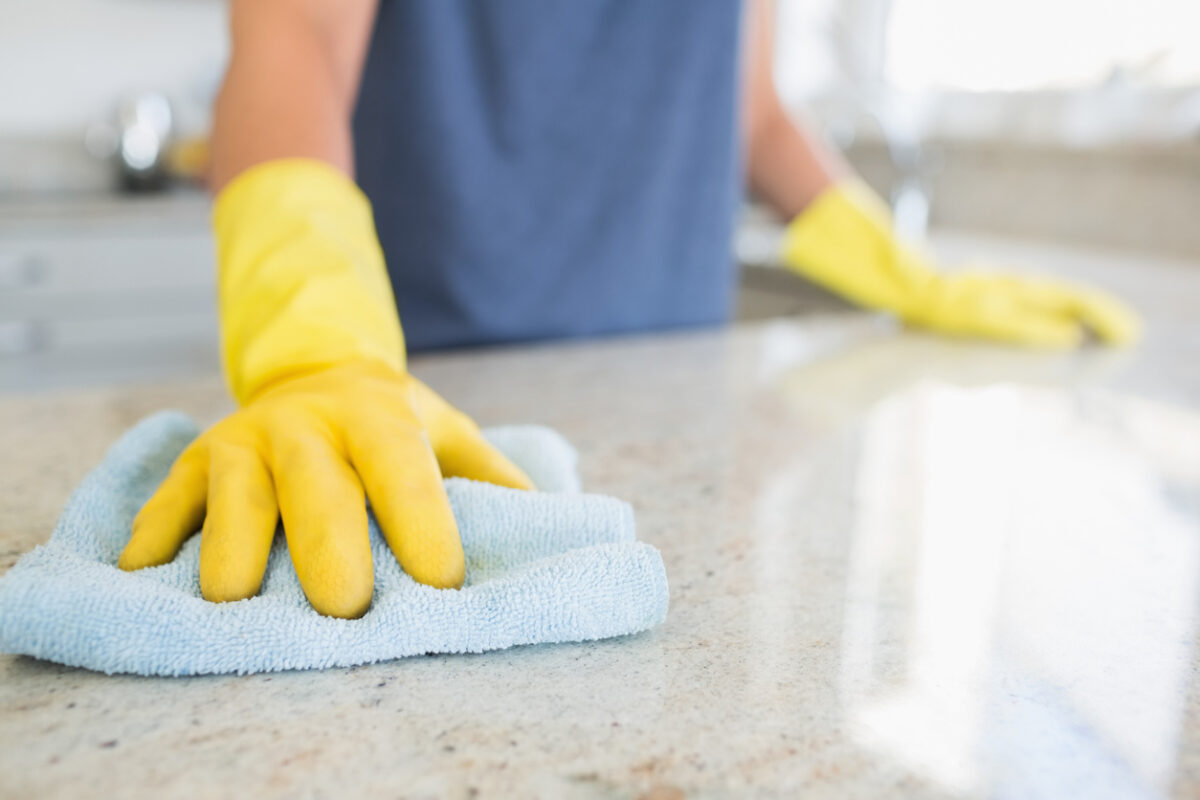

We may earn revenue from the products available on this page and participate in affiliate programs. Learn More ›
Quartz and Corian are two popular countertop materials that have been around for decades. While quartz is a natural material, Corian is actually a brand of solid surface countertops. The material was created by DuPont in 1967 and has become a popular option for kitchen countertops over the years . While Corian technically refers to a specific brand, the term has become more widely used to refer to many types of solid surface countertops.
Both quartz and Corian countertops are durable, attractive, and easy to clean, but they have some notable differences in terms of heat and scratch resistance, cost, and maintenance. We’ll explore the major distinctions between these two popular countertop materials and explore the pros and cons of solid surface vs. quartz countertops in order to help you decide which is best for your home.
Corian and quartz countertops are both made with natural minerals and binding resins.
Quartz and Corian are similar in that they are both solid surface materials made by combining natural minerals with binding agents. They differ from natural slab materials like granite and marble, which are made from 100 percent natural stone. Here are a few other ways to compare quartz vs. Corian.
- Corian solid surface counters are made by combining acrylic polymer and alumina trihydrate, a material derived from a type of sedimentary rock called bauxite ore. Corian is typically made up of 33 percent binding resins and 66 percent minerals. The colors in Corian countertops come from pigments added to the resin, so they’re consistent all the way through.
- Quartz is an engineered stone that ranges from 90 to 94 percent quartz crystals mixed with 6 to 10 percent epoxy resin. Pigments are also added to give the countertop its color. The material is available in a wide range of colors and patterns that mimic natural stone surfaces like granite or marble.

Quartz countertops are more scratch- and heat-resistant than Corian countertops.
Quartz and Corian are both durable materials, but they differ in terms of heat resistance and scratch resistance. In fact, the biggest difference between these materials lies in their resistance to heat. While quartz is not completely heat-resistant, it does perform better than Corian—hot pots and pans won’t damage the surface of quartz if they’re put down for a few seconds.
Unlike quartz, a Corian counter can be damaged by high temperatures, so it’s something to keep in mind if you’re planning on using the surface as your main cooking area. While you can use trivets to protect your Corian counters from heat damage, it’s best to use trivets or heat protectors under pots and pans for both quartz and Corian countertops.
In terms of scratch resistance, quartz also has the edge. It’s a harder material, so it’s less prone to scratching than Corian.
Related: What’s the Difference? Granite vs. Quartz
Corian solid surface countertops are easier to repair compared to quartz.
Another way to compare Corian solid surface countertops vs. quartz is how they’re repaired when damaged. While Corian may be more prone to scratching, those scratches can be buffed away relatively easily. You can sand out surface scratches or fill in chips with a repair kit.
With quartz counters, repairs are less DIY-friendly. You need to apply a special filler compound with a syringe applicator and then polish it down to match the finish of the rest of your countertop.
Both quartz and Corian countertops are nonporous and highly resistant to stains and germs.
One of the primary similarities between quartz and Corian is their nonporous finish. The two materials are both ideal for kitchen countertops because they resist stains and are incredibly hygienic.
Since Corian is made with a high ratio of resin, it’s known for being completely nonporous, making it resistant to stains. It doesn’t require a sealant and resists bacteria since there are no crevices where germs can hide out. Quartz countertops aren’t completely nonporous, but they’re close enough so that they don’t need to be sealed like other stone surfaces.

Corian is more flexible than quartz when it comes to curves and unique countertop shapes.
While both quartz and Corian are made with binding resins, Corian countertops use a higher percentage of these synthetic materials. This allows for greater flexibility in terms of shape, since the resins can be more easily molded into curved and rounded forms. This means that Corian countertops can be crafted into unique shapes and designed to better accommodate sinks and other countertop features.
Both materials can also be constructed as large single slabs, so unsightly seams from kitchen counters can be avoided. Since they can be made without seams, both Corian and quartz countertops are also more hygienic.
Related: A Beginner’s Guide to Engineered Stone Countertops
The costs for Corian vs. quartz countertops are comparable.
When it comes to Corian vs. quartz, the price differences are minimal. That said, shoppers will find quartz counters to be slightly more expensive than Corian in most cases, even if it’s only by a few dollars per square foot. You can generally expect to pay $50 to $100 per square foot installed for either quartz or Corian countertops.
Corian countertops cost between $45 to $65 per square foot before installation costs are factored in. Installing Corian counters typically costs $75 an hour. The cost of Corian countertops depends on the popularity of the color in question, with more popular colors carrying higher price points.
The price of quartz ranges from $50 to $200 per square foot installed, and the average price of installing quartz kitchen countertops in the U.S. ranges between $3,000 and $7,500. Corian, on the other hand, costs between $2,200 to $5,000, according to HomeAdvisor. This means both materials are more expensive than laminate countertops, but they are also more durable and heat resistant than laminate.
